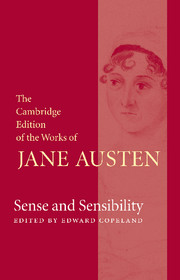Book contents
- Frontmatter
- Contents
- General Editor’s Preface
- Acknowledgements
- Chronology
- Introduction
- Note on the text
- Miscellaneous Frontmatter
- Sense and Sensibility: Volume I
- Sense and Sensibility: Volume II
- Sense and Sensibility: Volume III
- Corrections and Emendations to 1813 Text
- List of Abbreviations
- Explanatory Notes
Chapter 17
Published online by Cambridge University Press: 19 December 2020
- Frontmatter
- Contents
- General Editor’s Preface
- Acknowledgements
- Chronology
- Introduction
- Note on the text
- Miscellaneous Frontmatter
- Sense and Sensibility: Volume I
- Sense and Sensibility: Volume II
- Sense and Sensibility: Volume III
- Corrections and Emendations to 1813 Text
- List of Abbreviations
- Explanatory Notes
Summary
MRS. DASHWOOD was surprised only for a moment at seeing him; for his coming to Barton was, in her opinion, of all things the most natural. Her joy and expressions of regard long outlived her wonder. He received the kindest welcome from her; and shyness, coldness, reserve could not stand against such a reception. They had begun to fail him before he entered the house, and they were quite overcome by the captivating manners of Mrs. Dashwood. Indeed a man could not very well be in love with either of her daughters, without extending the passion to her; and Elinor had the satisfaction of seeing him soon become more like himself. His affections seemed to reanimate towards them all, and his interest in their welfare again became perceptible. He was not in spirits however; he praised their house, admired its prospect, was attentive, and kind; but still he was not in spirits. The whole family perceived it, and Mrs. Dashwood, attributing it to some want of liberality in his mother, sat down to table indignant against all selfish parents.
“What are Mrs. Ferrars's views for you at present, Edward?” said she, when dinner was over and they had drawn round the fire; “are you still to be a great orator in spite of yourself?”
“No. I hope my mother is now convinced that I have no more talents than inclination for a public life!”
“But how is your fame to be established? for famous you must be to satisfy all your family; and with no inclination for expense, no affection for strangers, no profession, and no assurance, you may find it a difficult matter.”
“I shall not attempt it. I have no wish to be distinguished; and I have every reason to hope I never shall. Thank Heaven! I cannot be forced into genius and eloquence.”
“You have no ambition, I well know. Your wishes are all moderate.”
“As moderate as those of the rest of the world, I believe. I wish as well as every body else to be perfectly happy; but like every body else it must be in my own way. Greatness will not make me so.”
“Strange if it would!” cried Marianne. “What have wealth or grandeur to do with happiness?”
- Type
- Chapter
- Information
- Sense and Sensibility , pp. 104 - 110Publisher: Cambridge University PressPrint publication year: 2006

